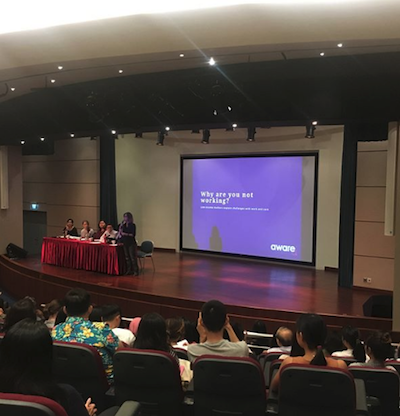-
Advocacy Theme
-
Tags
- Abortion
- Adoption
- Caregiving
- CEDAW
- Disability
- Domestic Violence
- Domestic Workers
- Harassment
- Healthcare
- Housing
- International/Regional Work
- Maintenance
- Media
- Migrant Spouses
- Migrant Workers
- Muslim Law
- National budget
- Parental Leave
- Parenthood
- Polygamy
- Population
- Race and religion
- Sexual Violence
- Sexuality Education
- Single Parents
- Social Support
- Sterilisation
- Women's Charter
A recap of our panel, “Poverty has a Woman’s Face”
September 18th, 2018 | Employment and Labour Rights, News, Poverty and Inequality
By Xenia Low, AWARE intern
 On 11 August, more than 300 people showed up at the Singapore Post Auditorium for the Poverty has a Woman’s Face panel, where we launched AWARE’s report ”Why are you not working?: Low-income mothers explain challenges with work and care. The panelists delved into a nuanced discussion of how low-income mothers balance work, home and care responsibilities while striving for economic security.
On 11 August, more than 300 people showed up at the Singapore Post Auditorium for the Poverty has a Woman’s Face panel, where we launched AWARE’s report ”Why are you not working?: Low-income mothers explain challenges with work and care. The panelists delved into a nuanced discussion of how low-income mothers balance work, home and care responsibilities while striving for economic security.
The panel comprised four speakers: Corinna Lim, Executive Director of AWARE; Dr Teo You Yenn, author of bestselling book This Is What Inequality Looks Like; Carrie Tan, Executive Director of Daughters of Tomorrow; and Siti Aishah, a participant of AWARE’s research and a mother of three. The session was moderated by Ng Kok Hoe, Assistant Professor at the Lee Kuan Yew School of Public Policy.
The event started off with a personal sharing by Siti Aishah who talked about her challenges with returning to work. In her attempt to switch from a part-time to a full-time job, she found that many companies were inflexible. To better support mothers in the workforce, Siti suggested that employers provide subsidised childcare near the workplace. She concluded her sharing by proudly professing how DOT, which has been providing its services to her for over a year, was like family to her.
Corinna then introduced AWARE’s report, which compiled findings from interviews with 47 mothers from low-income households. The report found that there were three major structural issues preventing low-income mothers from re-assimilating back into the workforce: a lack of family and public support for childcare, a lack of decent work; and the fact that work does not pay enough. AWARE had a few recommendations such as free childcare for children from low-income families, more flexible childcare hours in order to account for shift work, a new employment framework on the rights and benefits of casual workers, and enhanced ComCare and Workfare Income Supplement schemes to ensure that employment does not cause low-income households to be financially worse-off.
Carrie shared her thoughts on the structural barriers low income mothers face in the workplace. She points out that hard as it is to find full-time employment, the turnover rate amongst low-income mothers was rather high due to lack of services provided for mothers to balance both job and family responsibilities. So DOT started providing services for mothers such as child-minding and financial support. But overall, structural changes have to be made in the workplace so that the work service providers do can be sustained.
The final speaker was Dr Teo You Yenn, who stressed that while the struggle to “reconcile care work and paid work” is a common problem for women across socioeconomic backgrounds, women from lower-income households face additional inequalities. The choices middle-income families make on caregiving – for instance, paying for childcare or caregiving services – is not something that everyone can afford. Moreover, it normalises one particular solution to the problem, which takes away the possibility of meeting needs through the pooling of all available resources.
A panel discussion moderated by Dr Ng Kok Hoe followed after all the speakers, where they discussed issues such as minimum wage, potential benefits of fair treatment of workers, and whether early childhood education should be nationalised and made compulsory. An important question was raised in the audience Q&A segment, on how to bring such issues into daily conversation with family and friends. The panel suggested inviting friends and families to volunteering events and forums to spark their interest in these topics. You Yenn also mentioned that normalising these conversations is important to inspire more discussion amongst different groups of people.
Learn more:
- Read AWARE’s report on low-income mothers – “Why are you not working?”
- Read This is What Inequality Looks Like by Teo You Yenn
- Meet and learn from low-income women, or those working with them, to understand the challenges they face day-to-day
Spread the word:
- Speak to at least 5 persons about what you have learnt
- Share articles on inequality and poverty in Singapore on your own digital platforms
Stronger together:
- Sign up here if you are interested in volunteering on our future work / campaigns on issues relating to social inequality, including organising events related to Eradication of Poverty Day in October.
- Be a Donor. Your kind donation will go a long way to help women and to promote more equitable and inclusive policies through our various programmes and services.
- Become a Member. Our voice is louder and stronger when we have more members behind us.
- Register as a Volunteer to contribute your time and skills to AWARE.
- You can also stay updated with AWARE’s work by subscribing to our newsletter and our Facebook page!
- Donate to causes that champion the rights or support lower income persons (Daughters of Tomorrow, Beyond Social Services).



